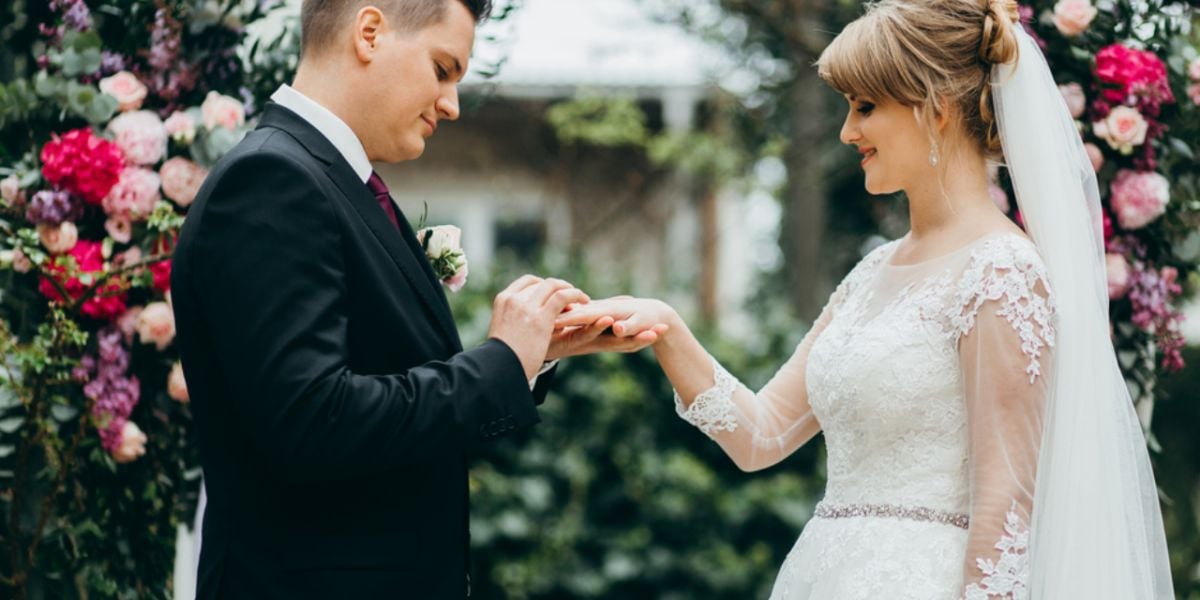
Meeting that special person to tie the knot and spend the rest of your life with is such a huge milestone. Many meet that special person in their home country, while others find them abroad. The tiresome bureaucratic marriage procedure in England, which many are subjected to, makes it feel impossible, but here are some guidelines.

Marrying legally in England has various terms and conditions, such as being 18 or over, not being closely related and not already married or in a civil partnership. So, it is essential to seek the correct information and carefully follow the terms and proceedings.
Giving notice of your intention to marry in England
To get married or form a civil partnership in England, you must visit the local register office to sign a legal statement declaring that you intend to get married. Known as ‘giving notice for marriage,' the statement - valid for 12 months - must be signed at least 29 days before the ceremony.
You must have lived in the registration district where you will give notice for the past seven days or more. If you and your partner live in different registration districts, you must give notice separately, each in their respective register office.
You must give notice together if one of you is from outside England.
At your notice appointment, you must bring originals of several documents, including details of the venue for the ceremony, a valid passport or birth certificate, and proof of home address (e.g., UK driving license, a recent utility bill, bank statement, Council Tax bill, tenancy agreement, etc.).
If you don't have a permanent UK address, you must give details of a UK contact (e.g., your partner, friend, etc.).
Finally, if you have been married or in a civil partnership, you must show a copy of a decree, absolute or final order of a divorce, or your former partner's death certificate.
Good to know:
In the period between the notice and the ceremony, objectors to the marriage can raise their objections.
Useful links:
Required documents to give notice
Copy of a decree absolute or final order
Marriage or civil partnership in England
What is the legal status of your relationship, and what are the legal differences between living together, getting married and entering a civil partnership?
Civil and religious marriage ceremony
You can choose between civil or religious marriage or both in England. Conditions and procedures generally depend on the selected religious institution. Some of the documents you will sign are the marriage register, a civil commitment document, etc., and you will need two witnesses.
The overall fees depend on where the wedding ceremony will be held. You must pay £11 to the civil status division to obtain your civil marriage certificate, which will be sent to you four days after the application. If you want the certificate to be issued either the same day of payment or the next day, a priority fee service of £35 can be requested.
In England, opposite-sex and same-sex couples over 16 years can marry in a civil or religious ceremony.
A marriage can take place in:
- a Register Office;
- premises approved by the local authority (e.g., a hotel);
- a church, a synagogue;
- a Meeting House if one or both partners are members of the Society of Friends (Quakers);
- the home of one of the partners if the partner is housebound or detained;
- in hospital;
- a licensed naval, military or air force chapel.
A civil marriage ceremony at the local Register Office takes 10 to 15 minutes. Even though the couple can exchange their own vows after repeating the standard set of vows, religious words or hymns aren't permitted.
At the end of the ceremony, the marriage register is signed by both partners, the registrar, and at least two witnesses. At the time of the marriage, you will obtain one copy of the entry of the marriage in the register.
Before signing the marriage register, double-check the information on it. It is possible to correct mistakes at the time of marriage. Corrections at a later stage will require additional bureaucracy and may be time-consuming.
A religious marriage in England can be registered during the religious ceremony conducted by the Church of England and the Church in Wales. The 29-day notice at the Register Office is necessary if one or both partners are non-UK nationals or if the religious marriage isn't conducted by the Church of England or the Church in Wales. Couples who get married in a Register office can have a religious ceremony too.
Important:
If the registrar has a reason to believe that the marriage is happening merely for immigration purposes, they must report it to the Home Office.
Civil partnership
A civil partnership gives legal recognition and legal rights and responsibilities to a relationship.
To register a civil partnership, you and your partner must give notice of your intention to register a civil partnership (see the dedicated subheading above). After a minimum of 29 days and within 12 months, you must appear before a registrar and two witnesses and sign the civil partnership schedule at any register office. There's no need for a ceremony, but you can if you wish to have one.
If you and your partner have registered a civil partnership abroad, you can be recognised as a civil partner in England without registering again in England. However, certain conditions have to be met.
Important:
You cannot legally bring a civil partnership to an end until a year has passed since you signed the civil partnership document.
Marriage for same-sex couples in England
Civil partnerships are available to same-sex couples. Couples who registered their same-sex civil partnership in England and Wales can convert it into a marriage. A religious premise is not obliged to host a civil ceremony between same-sex partners.
On the other hand, a religious ceremony can be held if the religious organisation has agreed to marry same-sex couples.
Same-sex marriage was legalised in England in March 2014. If you and your same-sex partner legally marry abroad, your marriage is recognised in England and Wales.
Important:
A transgender person who doesn't have a gender recognition certificate is legally considered to be the gender stated on their original birth certificate.
Legal requirements for getting married in England
Visit the British High Commission in your country, embassy or consulate in England. You can also visit the official government website for more information.
For UK residents, whether they are marrying a foreigner or a British national, they must be at least 16 years old. Anyone under 18 has to obtain their legal or parental guardian's approval.
Documents required
To be legally eligible for marriage in England, you will need the following documents:
- Your ID;
- Birth certificate;
- Nationality;
- Proof of address;
- Proof of your immigration status.
Information on English and Welsh marriage certificates:
- Date of marriage;
- Name and surname of both partners;
- Age of each partner;
- Condition (marital status);
- Rank or profession of both partners;
- Residence at the time of marriage;
- Fathers' names;
- Rank or profession of fathers;
- Name and surname of both witnesses.
Changing your name upon marriage in England
There's no legal obligation in England for one partner or the other to change their surname upon marriage. However, some partners find it convenient to have the same surname, especially when they have children or substantial financial agreements to make.
A woman who wants to change her surname to her husband's doesn't need a Deed Poll (a legal document proving a change of name). She can send her marriage certificate along with a cover letter to all government bodies and organisations (e.g., the Passport Office) that need to update their records with her new surname. However, if the husband wants to take his wife's surname, he must make a Deed Poll.
Another option is to incorporate your partner's surname in your surname, resulting in three names: Name - Middle Name - Surname.
On this occasion, you must make a Deed Poll to get your records, including your passport, revised.
A third, more modern option is to get a double-barrelled name, combining your and your partner's surname in one hyphenated version (the order of mention is up to you and your partner to decide). For a double-barrelled surname, you will need a Deed Poll. To make the process faster and less bureaucratic and avoid two Deed Polls, the husband can make a Deed Poll for the double-barrelled surname before the wedding.
After the marriage certificate is obtained, the wife can use it to change her records.
Good to know:
There are two types of Deed Poll: an unenrolled and an enrolled one through the Royal Courts of Justice, meaning you must put your new name on public record.
Marriage Visitor visa in England
You will be required to apply for a Marriage Visitor visa if you want to give notice of a marriage or civil partnership and, therefore, marry or register a civil partnership in England.
A Marriage Visitor visa costs £127; the earliest you can apply for this visa is three months before you travel to England.
The application for this visa is online, and the decision will be communicated to you within three weeks.
The Marriage Visitor visa is valid for a short stay and doesn't give you the right to stay or settle in England after your marriage or civil partnership takes place (which should happen within six months of the visa holder's arrival to England).
The Marriage Visitor visa cannot be extended or switched to another visa.
Good to know:
You must apply for a Standard Visitor visa to convert a civil partnership into a marriage.
If you wish to remain in England permanently after marriage and your partner is a permanent resident in England, you can apply for a Family visa.
Family visa in England
If you are legally married to a British resident and wish to move to England, you must apply for a Family visa.
To qualify for this visa, you will need proof of your marriage, to be more than 18 years old, and be able to show that you have plans to live together permanently.
You and your partner must also provide evidence of financial stability to support yourselves and prove that your sponsoring partner (i.e., England resident) has a stable job and earns at least £29,000 per annum. You may also need to pay the healthcare surcharge.
The approved Family visa allows you to work and study in England and lasts two years and nine months.
Good to know:
If you have a six-month visa for an engaged partner, you aren't allowed to work or study in England.
After your wedding or civil partnership ceremony, your partner can apply for a partner visa, enabling them to work.
We do our best to provide accurate and up to date information. However, if you have noticed any inaccuracies in this article, please let us know in the comments section below.








